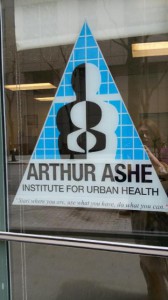Arthur Ash Institute for Urban Health
May 3rd, 2015, in 483 Hudson Ave, Brooklyn, NY
I am a big fan of tennis, and I play tennis, too.
I am having a pleasure to introduce Arthur Ash, a Wimbledon Champion, former David Cup Coach, Activist, and one of the most famous African American in the history.
Little about Arthur…
Ashe began to play tennis at the age of seven in a neighborhood park. He was coached by Walter Johnson of Lynchburg, Virginia, who had coached tennis champion Althea Gibson. Ashe moved to St. Louis, Missouri, where he was coached by Richard Hudlin, before he entered the University of California at Los Angeles on a tennis scholarship. In 1963 Ashe won the U.S. hard-court singles championship; in 1965 he took the intercollegiate singles and doubles titles; and in 1967 he won the U.S. clay-court singles championship. In 1968 he captured the U.S. (amateur) singles and open singles championships. He played on David Cup US Team (1963–70, 1975, 1977–78) and helped the U.S. team to win the Davis Cup challenge (final) round in 1968, 1969, and 1970. In the latter year he became a professional.
His criticism of South African apartheid racial policy led to denial of permission to play in that country’s open tournament, and, as a consequence, on March 23, 1970, South Africa was excluded from Davis Cup competition. In 1975, when he won the Wimbledon singles and the World Championship singles, he was ranked first in world tennis. After retiring from play in 1980, he became captain of the U.S. Davis Cup team, a position he held from 1981 to 1985.
Ashe underwent coronary bypass operations in 1979 and 1983. In April 1992 he revealed that he had become infected with the virus that causes AIDS, probably through a tainted blood transfusion received during one of those operations. For the remainder of his life, Ashe devoted considerable time to efforts to educate the public about the disease.
He was a thinker in the court. He always had a plan to win, even he was behind the game. He did not have a big service, but his accuracy of the shot helped him to succeed in the tennis.
There was a time that his visa application for the entrance to South Africa was denied due to antiapartheid statements he made to the press, Ashe was one of several athletes whose activism helped spark the antiapartheid movement in sport. He made several trips to South Africa as a player and journalist throughout the 1970s and 1980s, each time drawing the world’s attention to the living conditions of black Africans under apartheid. Unlike many leaders of the Black Power Movement in the United States and the Black Consciousness Movement in South Africa, Ashe believed in open dialogue and debate with white officials in both countries, a strategy which led radicals in each nation to label him an “Uncle Tom” and a race traitor.
This explains his intelligence, and his intelligence helped him in a great deal with tennis, as well.
He was very quiet on the court. He rarely complained to the umpires, like players today. But he was definitely a fighter in his way.
His elegance and grace will be remembered, as well as all the milestones he made thorought his career, as a tennis player, as an activist, as and coach, as a proud black man and as a human being.
R.I.P. Arthur
Musa Watanabe
Arthur Ash, American Tennis Player. The Britannica website. Retrieved on May 6 2015. http://www.britannica.com/EBchecked/topic/38179/Arthur-Ashe




